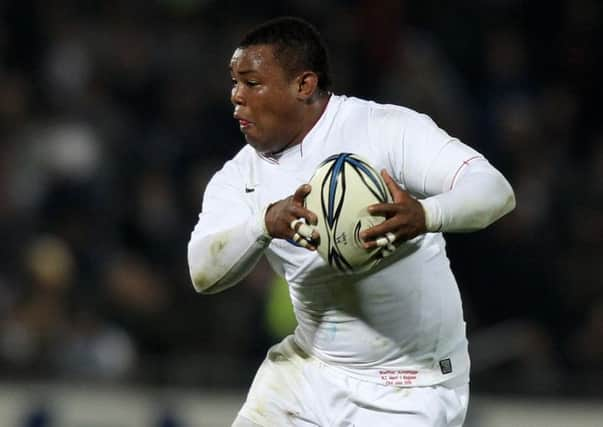Iain Morrison: Passport rules for rugby a shambles


It’s an important time in the development of modern rugby, with a World Cup staged by England next year followed quickly by rugby sevens being showcased at the Rio Olympics in 2016. Fifteen-a-side rugby has been an Olympic sport in the past: USA are the reigning champions, even if that gold medal came way back in 1924 at the Paris Olympics. Incidentally the USA also won in Antwerp four years earlier, so they can claim to be the most successful rugby team in Olympic history.
Twelve teams will compete at the Rio Olympics. The first four on the International Rugby Board (IRB) pecking order at the end of the regular 2014/15 season will go through automatically. They will be joined by one country from six qualifying tournaments on each continent which leaves one spare place for a repêchage and one space for the hosts Brazil.
Advertisement
Hide AdAdvertisement
Hide AdThe re-introduction of rugby, through sevens, on to the Olympic agenda could be a game changer. It opens up funding across the globe and makes nations sit up and pay attention. Just imagine their potential if the USA or Germany, to take just two examples, ever cajole their best athletes into rugby. Unfortunately there are some high hurdles to negotiate first, with the prospect of the high jump if rugby doesn’t get it right. Sevens is only guaranteed a place at the next two Games (Rio and Tokyo) so it needs to make a splash in Brazil, soccer’s spiritual heartland.


The main problem centres around how athletes qualify for a country and this, at the risk of sounding like a broken record, is where the IRB’s lax player eligibility rules jump up and bite it on the backside.
As anyone with memories of the Zola Budd fiasco will remember, the International Olympic Committee (IOC) requires athletes to actually belong to the country they represent, by which the IOC means holding a passport. South African runner Budd was fast-tracked for a UK passport ahead of the Los Angeles Olympics in 1984, only to trip the home hopeful Mary Decker and end up an even worse pariah than the country of her birth.
As things stand in rugby, international eligibility can be secured by three-year residency or a grandparent from the country concerned, but the IRB has to kowtow to the IOC on this matter – especially given rumours that rugby’s boss Bernard Lapasset has his sights set on joining that august body – and the consequences are horribly messy.
Firstly, players who have already been capped will be able to apply to play for their original country (or any other country) provided they either have or obtain a passport and stand down for the 18 months ahead of Rio (the period is extended to three years thereafter). For example, Scotland winger Sean Maitland has a New Zealand passport so could play for the All Blacks in Rio (with an 18-month stand-down period) but he is not eligible to play for the Great Britain team. Meanwhile, Pacific islander winger Sitiveni Sivivatu, who has been discarded by the All Blacks, could return to play for the land of his birth provided he retains a Fijian passport. If he doesn’t you suspect that the island government could rustle one up pretty quickly.
This had given legs to the story that Toulon’s star flanker Steffon Armitage, who grew up in the South of France, will apply for a French passport and play sevens for his new country in the Olympics, which would then qualify him to play 15-a-side rugby for France, despite having already earned five England caps. Alternatively Armitage, who was named European Player of the Year in May, could apply for a Trinidad and Tobago passport and play for the land of his birth, although that seems unlikely. So far so farcical and it only gets worse.
The IRB wants to limit the number of players changing countries so they have insisted that any application to swap country and colours would have to be passed by a “Regulations Committee” tasked with ensuring that players were not utilising the mis-match in eligibility criteria between the IRB and the IOC just to play international 15-a-side rugby for another country.
So a process that should have perfectly legible legal boundaries – as exists at the moment with the grandparent or three-year residency rule – suddenly becomes the prerogative of a bunch of committee members. Heaven help us. I have no idea whether Armitage is a fan of the short game, although he looks admirably well equipped to thrive in it, but I am absolutely certain that any committee of IRB worthies has no better window into the player’s head than I do.
Advertisement
Hide AdAdvertisement
Hide AdIt gets worse. In the admittedly unlikely scenario where the GB team pick some entirely new faces who have not been capped by England, Wales, Ireland or Scotland but who play in the Olympic Games for Great Britain, they too need to be “captured” and, because the GB team is representing disparate unions, the player “must elect” which union they want to play for. Theoretically an uncapped Englishman could elect to play for Wales with the promise of a cap or a contract. The Scots might finally get their hands on a Welsh stand-off thanks to the same regulations. The Irish are even involved in this nonsense thanks to Northern Ireland being part of the UK.
The IOC’s rules admit players changing nationalities (remember all those African distance runners turning out for the United Arab Emirates and such like) but rugby players are seemingly allowed only one choice and once that is made they have to stick with it “for all forms of the Game and in all events” (Reg 8.12). However, that only applies to rugby, so a former rugby player could potentially represent another country in another sport. It’s a mess.
Rugby will undoubtedly gain from inclusion in the Olympics, but at what cost? Already lawyers specialising in sport are rubbing their hands together and picking out a colour scheme for their new villa in the South of France. The current set of regulations, even if they are absurdly lax, are at least set in stone whereas Olympic Sevens eligibility will be at the discretion of a committee of worthies who must delve into men’s (and women’s) souls to determine what motivates them.
It is an unholy shambles and that is before the consequences of a “Yes” vote on 18 September are factored in. Yet almost everything would be sorted if only the IRB adopted the IOC eligibility criterion of a passport (or five years’ residency which is pretty much when foreigners can apply) instead of running two concurrent, competing and confusing eligibility criteria side by side.
It will happen just as sure as eggs is eggs, but not before some of the same stuff covers the faces of the IRB suits who resolutely refuse to do the blindingly obvious.